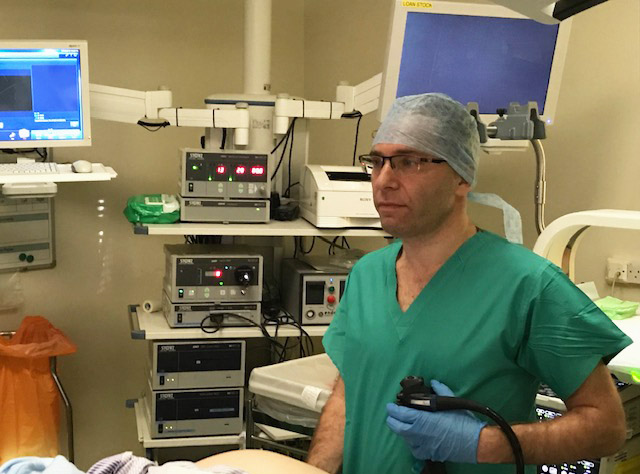A colonoscopy is a routine test to examine the lining of your bowel, also called the large intestine or colon. This is done using an endoscope, which is a flexible tube, about the thickness of a (little) finger, which has a camera and light at one end. It is passed through the anus (back passage) and carefully moved around the large bowel.
By looking down the endoscope, I will be able to get a clear view of the lining of your colon. This will help me to diagnose your symptoms or check any bowel condition that you have had diagnosed in the past. You may have been advised to have a colonoscopy if you have.
- bleeding from your anus
- pain in the lower abdomen (tummy)
- persistent diarrhoea
- changes to your bowel habit
- a strong family history of bowel cancer
- been placed on a bowel cancer screening pathway
- have an existing condition that needs reviewing such as Crohn’s disease or colitis.
Serious complications are extremely rare. The most serious risk is the endoscope damaging your colon during the test. This can cause an infection, bleeding or a perforation (tear) of the lining of the bowel. If this happens, your abdomen may become painful and bloated and you may need medicine or surgery to treat the problem.
If a biopsy is taken or a polyp is removed during the test, you may pass a small amount of blood from your anus after the test. This should only happen up to 12–24 hours after the test and is usually no more than a few teaspoons full.
Please note that rarely the test may need to be abandoned or may be incomplete. This can happen if you find the procedure too uncomfortable or if the bowel preparation did not empty your bowel completely. In this case, the test may need to be repeated or we may suggest an alternative procedure.
To make sure the doctor has a clear view of your colon, it must be completely empty. Therefore, you will be asked to follow a special diet for a few days before the procedure.
You will have to take a laxative (substance that speeds bowel movement) before the test. Full details will be given to you when you come for your consultation with me.
If you have any questions about the test, you will be able to discuss them at this time. You will also need to drink more fluids on the day before your colonoscopy. You should aim to drink a glass of water every hour.
This test is normally performed with sedation or an injection of painkillers. This is medication that makes you relaxed and sleepy but does not put you completely to sleep.
The test itself only takes about 30 minutes and endoscopy nurses will be present throughout for reassurance. You will be asked to lie down on your left-hand side on a couch with your knees bent. The procedure will start by inserting a finger into your anus to perform a rectal exam and this will help lubricate the anal passage and identify if there are any significant haemorrhoids or growths able to be felt in your anal passage.
The endoscope will then be inserted into your lower bowel through your anus. Carbon dioxide will be passed down a channel in the endoscope, expanding your bowel to make it easier to see the lining. This may make you feel slightly bloated and you may feel the urge to go to the toilet, but you will not be able to do this as your bowel will be empty. Many people pass some wind during the test. This is perfectly normal and is nothing to be embarrassed about.
If polyps are present, I will remove these during the procedure. You will not feel this. When a polyp is particular big or in a difficult position the removal may be deferred and re-booked on a separate day.




